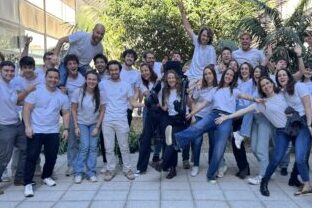7th June 2024
- Teresa Riesgo, Secretary General for Innovation, highlights public-private collaboration and training as the cornerstones for promoting innovative solutions in the field of start-ups and healthcare organisations.
- Two Spanish startups, SAVANA and LEUKO, consider it key for healthcare entrepreneurship to make progress in the reluctance to share data.
- Hospital representatives from Spain and Portugal call for swift regulation to enable AI adaptation without compromising patient safety
Madrid, 6 June 2024.- With the clear objective of accelerating the innovation movement for health in Spain, within the European context, EIT Health Spain, a Co-Location Centre (regional hub) of EIT Health, which is part of the European Institute of Innovation and Technology (EIT), a body of the European Union, has organised a specific space for innovation in the health sector within the framework of the 12th edition of South Summit, which is being held on 5, 6 and 7 June at La Nave in Madrid.
The meeting was attended by representatives from both public and private institutions to address the specific challenges faced by entrepreneurs and innovators in the health sector. Teresa Riesgo, Secretary General for Innovation, Ministry of Science, Innovation and Universities of the Government of Spain, pointed out in a first session together with Izabel Alfany, EIT Health Spain General Manager, that “cooperation is important. This is why public-private partnerships play a key role in the health sector, acting as catalysts for the development and implementation of innovative solutions. Entrepreneurs, both in startups and within healthcare organisations, can tap into this potential by integrating into these innovation ecosystems, such as EIT Health. In doing so, they have access to a network of professionals from a range of disciplines, from healthcare to engineering to artificial intelligence. This interconnectedness facilitates the exchange of ideas, collaboration on projects and acceleration of the innovation process.
Another of the keys to progress in healthcare innovation highlighted by Teresa Riesgo was on education: “Education is an essential component in driving innovation in the healthcare sector in Spain. The government, in collaboration with all regions, business communities, patient associations and the entire ecosystem, is working to foster alliances that promote training”.
The key to health innovation is to involve all stakeholders without exception and all innovation ecosystems that have an impact on people’s health. Decision-makers and institutions have a fundamental role to play in this drive. “We need them to smooth and facilitate the path for entrepreneurs in this complex sector, with an environment that helps them to innovate and succeed”, explained Izabel Alfany in her speech.
Collaboration and technology: entrepreneurs’ keys to disruptive innovation
The second session of EIT Health Spain at South Summit 2024, moderated by Clara Cuervo, Senior Director Digital Precision Healthcare for Europe and Canada at AstraZeneca, was attended by two entrepreneurs with disruptive projects in the healthcare sector: Ignacio Hernández Medrano, founder of SAVANA, who has launched the Spanish startup pioneer in the application of artificial intelligence to clinical data; and Álvaro Sánchez Ferro, co-founder and Chief Medical Officer of LEUKO, who has developed the world’s first device to monitor white blood cells on a daily basis using a non-invasive optical system.
Both shared their perspective on how to generate value in the healthcare sector and the challenges they are currently facing. Álvaro Sánchez pointed out the importance of focusing on the patient and the need to align all the actors involved in order to obtain valuable feedback and address the specific needs of each sector. “Aligning the entire healthcare ecosystem, with the patient at the centre, is key to success. It is not enough to be disruptive, practicality must be taken into account”.
Ignacio Hernández highlighted the impact of diseases on society and the importance of predictive models. “Our algorithms offer value for the entire healthcare ecosystem. Effective implementation and the reluctance to share data are areas where progress is still needed, as they are essential to progress in this field.”
In terms of the keys to helping entrepreneurs to boost their projects in the healthcare sector, Álvaro Sánchez pointed out that “it is important to have a solid team and to take into account the specific needs of each stakeholder“. Ignacio Hernández stressed the need to understand each country’s regulations and the need to collaborate with ecosystem partners. “The healthcare sector requires a unique approach that sometimes defies market logic. Thinking about efficiency is essential, but in healthcare we must be aware of political and social sensitivities,” concluded the SAVANA founder.
Truths and myths of adopting AI in healthcare
The last session was moderated by Julien Venne, Director of New Opportunities & Business Development at EIT Health, with the participation of three leading representatives of healthcare organisations from Spain and Portugal: María Luaces, Director of the Innovation Unit of the Hospital Clínico de Madrid; Alba de Martino, Director Area of Knowledge of Innovation of the Instituto Aragonés de Ciencias de la Salud and Mafalda Carvalho, Innovation Project Manager of the Centro Hospitalario Lisboa Norte, Portugal.
Maria Luaces emphasised the importance of co-creation and collaboration between all actors in the healthcare sector, from decision-makers, healthcare professionals, engineers and others to test and develop new technologies. “We are committed to progress in technology and artificial intelligence and receive valuable feedback from the development of innovations,” she said.
Alba de Martino pointed out that “effective implementation of AI has not yet been achieved. We need to work together to build trust and speak a common language to facilitate the adoption of new solutions in local hospitals.
Mafalda Carvalho, for her side, emphasised the need for a dialogue that allows all actors to understand and contribute to the advancement of public health. “We must make sure that solutions are not only spectacular, but that they really help public health.
On the other hand, the three experts agreed on the importance of having an agile regulation that allows for the rapid adaptation of AI without compromising patient safety. “Regulation must protect citizens, but also allow for progress and open conversation about the use of data and algorithms“, said Alba de Martino.
Finally, the experts agreed to focus on collaboration between institutions, companies, startups and public administration to facilitate the co-creation and adoption of innovations in healthcare. “We encourage startups to establish contact with institutions to help and guide them in the process”, concluded María Luaces.
EIT Health and the EDIT-B consortium transform bipolar disorder diagnosis with groundbreaking blood test

Discover this life-changing project today.
Three EIT Health innovators nominated for EIT Awards

Meet our three EIT Award nominees.
Hospital Clínic study reinforces patient participation as key to digital health innovation

New work published in Journal of Medical Internet Research.